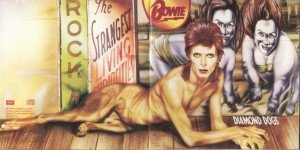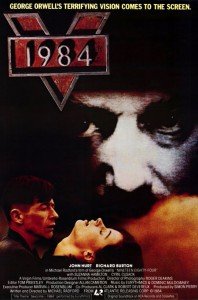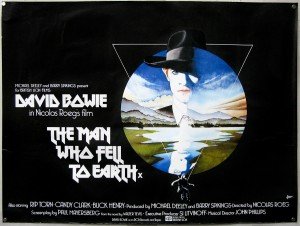
David Bowie’s reputation for innovation has never been doubted. His music, art and characters seem to be shouting from a futuristic pulpit of creativity. Space Oddity was in tune with the craze for outer space exploration at the time of its release, from the first moon landing to the opening of Kubrick’s influential 2001 A Space Odyssey. Ziggy Stardust’s origin was beyond our world. And then there was Diamond Dogs.
 Diamond Dogs was released in April 1974, inspired originally by George Orwell’s celebrated novel of the dystopian future of the year 1984. What allegedly began as a hope to bring the book to stage ended up as creative visions for a fantastic concept album. For those familiar with the book, elements of it immediately jump out at you from a reference to giant rats in Future Legend to the line ‘putting pain in a stranger’ from Sweet Thing. Rebel Rebel can easily be applied to the novel’s antagonist, Winston Smith, who desires freedom to feel outside the restrictions of the totalitarian state whose cameras are always watching.
Diamond Dogs was released in April 1974, inspired originally by George Orwell’s celebrated novel of the dystopian future of the year 1984. What allegedly began as a hope to bring the book to stage ended up as creative visions for a fantastic concept album. For those familiar with the book, elements of it immediately jump out at you from a reference to giant rats in Future Legend to the line ‘putting pain in a stranger’ from Sweet Thing. Rebel Rebel can easily be applied to the novel’s antagonist, Winston Smith, who desires freedom to feel outside the restrictions of the totalitarian state whose cameras are always watching.
Bowie’s futuristic vision concentrates on urban chaos and decay as the book did, but Bowie goes even further into the terrain of sci-fi with mentions of mutations and more.
Another book/film which seems to have echoes in Diamond Dogs is A Clockwork Orange. Based on a 1962 novella by Anthony Burgess and directed by Stanley Kubrick, the 1971 film met great criticism due to its use of violence by roving young gang members amidst a not too futuristic urban setting. Malcolm McDowell starred as the film’s central character, Alex. As he and his droogs (comrades) wandered the night in search of thrills they were clad in white outfits and eye lashes much in keeping with the 70’s tradition of glam. Alex in fact might be a far better contender for the title of Rebel Rebel then Winston Smith.
 1984 itself was filmed several times itself, perhaps its most interesting version starred John Hurt as Winston Smith and Richard Burton. The film was seriously bleak and was released in 1984. Interestingly, Orwell simply switched the year he was writing it – 1948 to 1984 – as he felt it was the themes that identified the book and not a science fiction prediction.
1984 itself was filmed several times itself, perhaps its most interesting version starred John Hurt as Winston Smith and Richard Burton. The film was seriously bleak and was released in 1984. Interestingly, Orwell simply switched the year he was writing it – 1948 to 1984 – as he felt it was the themes that identified the book and not a science fiction prediction.
Bowie never did manage to bring his 1984 ideas to complete concept fruitation. In the 90’s Bowie did fashion a stunning concept album titled Outside in which futuristic phobias and art blended in a chilling manner. The album is a personal favorite of mine. Bowie creates and voices several fascinating characters for Outside.
Considering Bowie’s unique look, it’s no surprise that he has been called upon to create otherworldly characters for film. Peter O’Toole was reportedly the first actor wanted to portray the lead in The Man Who Fell to Earth, but when it didn’t work out, Bowie was called upon. Bowie gives his character an alien appeal while making him more than sympathetic as he undergoes and eventually succumbs to the corruptions associated with wealth’s temptations in society. The alien’s mission is to return to his home world with water, but his business affairs draw the attention of shadowy government agents and it’s all downhill for him from there.
 The Man Who Fell to Earth was released in 1976. Its story was set in a contemporary urban environment. Its director, Nicolas Roeg was no stranger to working with rock stars – Mick Jagger had appeared in Performance, a film which pondered the question of identity like The Man Who Fell to Earth. In fact the question of identity is so pronounced in The Man Who Fell to Earth that some argue about Bowie’s character’s true origins. Roeg is known for fashioning fantastic imagery and allowing his film’s narrative to be presented in cryptic pieces, sometimes out of order. This reminds me of Bowie’s own work and his habit of cutting different lines and pasting them into lyrics. William Burroughs supposedly used a similar method in his writings.
The Man Who Fell to Earth was released in 1976. Its story was set in a contemporary urban environment. Its director, Nicolas Roeg was no stranger to working with rock stars – Mick Jagger had appeared in Performance, a film which pondered the question of identity like The Man Who Fell to Earth. In fact the question of identity is so pronounced in The Man Who Fell to Earth that some argue about Bowie’s character’s true origins. Roeg is known for fashioning fantastic imagery and allowing his film’s narrative to be presented in cryptic pieces, sometimes out of order. This reminds me of Bowie’s own work and his habit of cutting different lines and pasting them into lyrics. William Burroughs supposedly used a similar method in his writings.
Whether alien, actor, rock star or artist, Bowie always manages to bring a distinct wonder to his work.
W. P. Rigler – twitter @riglerwrites
W. P. Rigler’s books – http://www.lulu.com/spotlight/wrigler